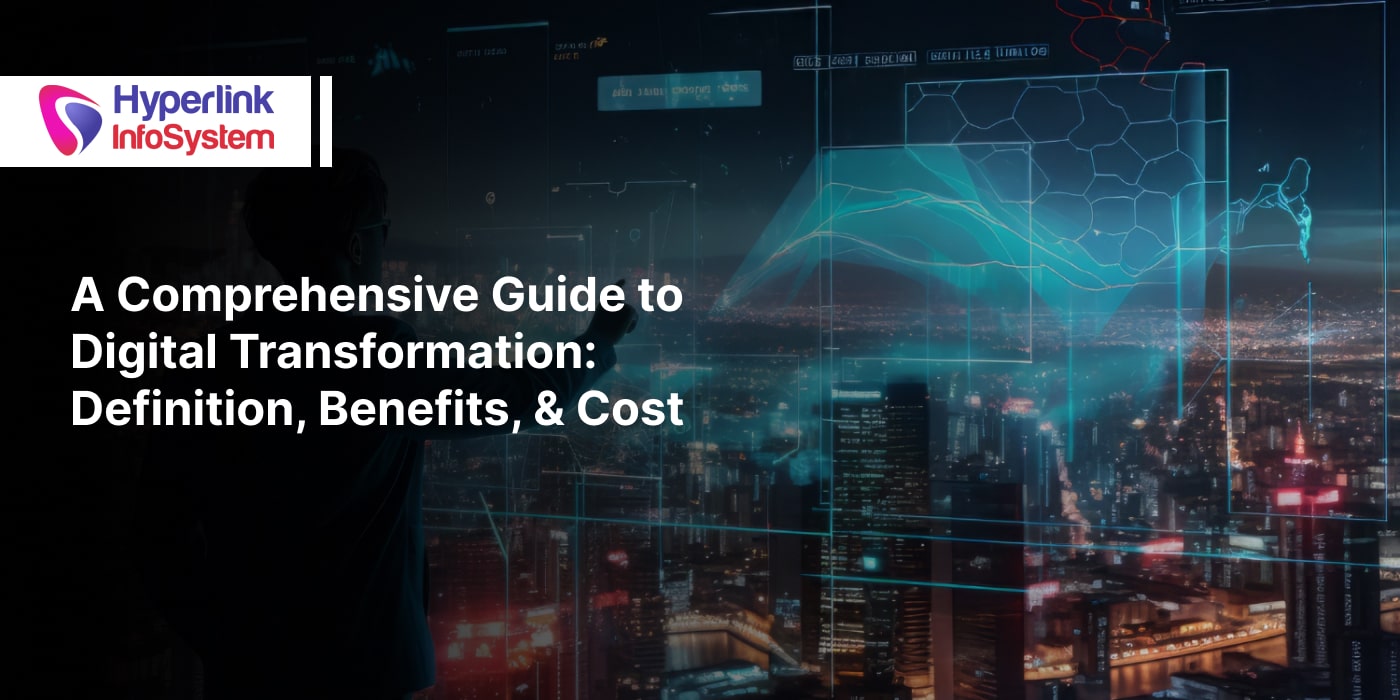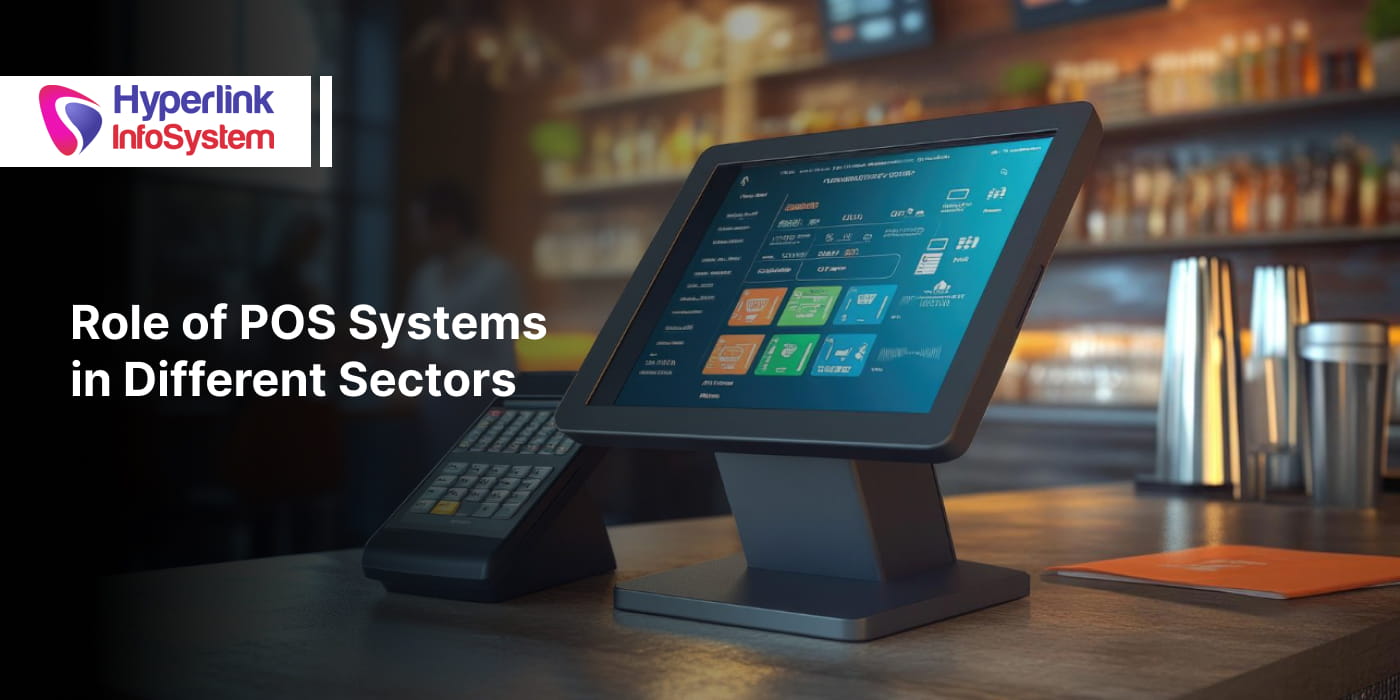A Comprehensive Guide to Digital Transformation: Definition, Benefits, & Cost
Jun 2024

The 2024 digital landscape is a rapidly evolving one, and businesses failing to adapt are for sure to fall behind. That's where the whole concept of digital transformation steps into the picture. Digital transformation is more than a buzzword; it is a revolutionary way of running enterprises at the present moment. But what is the role and importance of digital transformation in business and management- it's the ultimate fundamental shift and trailblazing strategic approach for seamlessly integrating all technologies to stay relevant and regain their competitive edge. Seamlessly blending top-notch digital technologies into every aspect of your enterprise operations, is the ultimate way to ensure success.
Incorporating digital technology into all facets of a business is altering the way enterprises operate and deliver value to their patrons. Digital transformation helps companies streamline their operations, eradicate duplicative approaches, and enhance overall operational efficiency. By investing in cutting-edge technologies and contemporary procedures, enterprises can reduce expenditures associated with mundane tasks, fallacies, and structural inefficiencies. Automating your daily workflows and functioning using data-driven insights directs you to more uncluttered and efficient processes, resulting in a spike in productivity and more subordinate operating expenses.
As a consequence, if your business wants to optimize operational processes and reduce overall expenses by incorporating the latest tools and technologies the main concern arising is how much digital transformation costs. This blog delves deep into the entire digital transformation definition, benefits, and costs, as well as how a top application development company can help you navigate the entire process.
What Is Digital Transformation?
The typical digital transformation definition isn't just adapting modern gadgets and advanced software solutions. It's also about radically transforming how your organization functions in order to truly leverage the magical power of technology. Digital transformation helps you to streamline processes by automating mundane and repetitive activities using AI and other automation instruments. It also entails crafting user-friendly mobile applications, and interactive websites, with uncomplicated navigation structures that also adhere to digital accessibility.
Digital transformation also enables data-driven decision-making, by employing insights and enhancing operations. By rethinking old processes, restructuring the organization, embracing innovation, and exploring emerging technologies like cloud computing, AI/ML, data analytics, process automation with robotic process automation (RPA), digital channel customer interactions, and blockchain, you can truly welcome the new potential that this transformative solution brings.
Digital Transformation & Why Is It Important?
In the present-day cutthroat marketplace, digital transformation is now no longer an obligation, it's a compulsion. There's no one characterization to explain the process of digital transformation. It leads to quicker turnaround times and decreased expenses while fostering customer loyalty. Enabling better-informed business decisions for growth and staying a step ahead using innovative solutions attracts new users as well as talent. Let's look at the types of digital transformations for enterprises that are currently trending:
- AI/ML: When blended with sweeping data programs, these insights stimulate firms to make prompter, more authentic selections in sales, marketing, product maturation, and other significant areas.
- IoT: Sensors built into a variety of gadgets yield massive volumes of data, which could potentially be used to feed cloud- or edge-based statistical analysis.
- Cloud Computing: Cloud computing, with its flexible computation and data collection capabilities, is often utilized as the cornerstone for digital transformation agendas, as well as cloud-based ERP solutions and CRM solutions.
- Commoditized Information Technology: This allows businesses to invest in distinctive IT modifications that set them apart from all their competitors.
- Hyperautomation: This comprises modern technologies such as artificial intelligence and machine learning, RPA, and business process management for automating the entire company.
- Edge Computing: Enables an additional layer for business computing and archiving, allowing use cases in sectors like manufacturing, medical care, and commerce.
- Smartphone Platforms: Empower activity to take place anywhere, anytime.
Digital Transformation Benefits
As lucrative as it may sound, reductions in digital transformation costs can be better derived from automating repetitive and ineffective processes while putting the rest of the investment into client acquisition tactics. Some of the common benefits of digital transformation for enterprises also contribute to controlling costs:
1) Resources and Labor Expenses
Implementing digital transformation strategies will help you stay on track with all your upkeep planning and system maintenance plans, along with other tools. This significantly reduces all your expenses for additional energy maintenance. Likewise, by automating your company functions, you can greatly lower overhead expenditures for administrative chores, in-house fanfares, management obligations, and training sessions.
2) Resource Allocation
The moment you begin digitally transforming your business, old legacy systems start to get replaced gradually, which is exclusively dedicated to specific divisions of your business. Integrating digital transformation in business and management and forming an immaculate end-to-end digital transformation strategy holds the power to eliminate manual labor and the expenses associated with it. Similarly, on-demand solutions can help your enterprise respond smarter to the latest evolutions and client requests.
3) Better Customer Engagement
One of the most sought-after business benefits of digital transformation is increased client engagement. Integrating cutting-edge technology into an organization's internal structure can drastically improve the communication between the company and its customers. Digital transformation opens up potential avenues to engage with consumers and understand their needs and specific demands. By distributing the correct resources at the right point, you can ensure long-term cost savings.
4) Augmented Income
Speaking of revenue generation via digital business transformation, it's important to consider the potential ROI points for the same. Since the majority of this blog is centered on digital transformation cost-benefit analysis, it's undeniable to note the impact this module has had over the years in the corporate profitability category. Many mobile app development companies hire dedicated developers to incorporate modern functionalities for developing their overall business strategy and digitizing their operations as per the latest trends.
5) Quicker Time to Market
The reduction in product life cycle is one of the greatest visible benefits of digital transformation. Particularly, when development expenses are larger, technological innovations for company operations are the means for staying ahead. Due to the ever-changing technological advancements, the economics of the whole development and manufacturing sector may shift in subsequent years.
How to Accelerate Enterprise Digital Transformation? Challenges and Remedies
Starting a digital transformation journey to accelerate enterprise operations needs a load of strategic planning, precise skills, and adapting to change management in addition to considering a myriad of unexpected components. When you need an understanding and answer from your team to explain the process of digital transformation in your large-scale enterprise, the key is to plan ahead of time to minimize any potential roadblocks. Check out the list of digital transformation obstacles and solutions to achieve excellent results for your enterprise:
1) Planning
More and more businesses are embracing digital transformation to integrate modern technologies to meet shifting demands of customers. The major concern here is the need to craft a foolproof digital transformation plan which should include why you need it, what the areas of priority, focus points, targetted technologies, and what the potential digital transformation benefits proffer to your business, overall implementation plan, enforcement plan, and how you plan to launch it within your enterprise. Creating this strategy or plan is not as smooth as you think; you shall incur different roadblocks, issues, and even limitations in your proficient skillset.
2) Managing Data
Whenever you're planning a cloud migration, businesses frequently face issues with gathering, filtering, and transferring data from their previous legacy systems into the cloud environment at scale. Proper management of cloud migration requires a particular set of skills, budget, and execution. This facilitates seamless administration and security, all while increasing enterprises' digital accessibility and overall usage convenience. It's a tough issue for businesses that don't possess dedicated data management staff. To overcome this, businesses should enforce strong data governance rules and invest in data security measures that include efficient data and network monitoring as well as disaster recovery.
3) Complexity and Integration
Integrating legacy systems with modern digital technologies or upgrading complicated corporate systems while maintaining staff morale is a difficult process. To avoid this issue in your digital transformation journey, businesses are typically encouraged to devise an immaculate digital transformation plan that covers everything from the tech stacks to be utilized to their interlinkages with third-party applications. Modernization and data control strategies can significantly aid this obsolete system.
4) Regulatory Compliances
Concerns related to data security and user privacy appear as a result of enterprise digital transformation. To do this, businesses should navigate regulatory frameworks governing data security, privacy, and additional digital elements while adhering to evolving rules. This is where the major issue stays, demanding professionals with experience in implementing digital transformations that adhere to local laws and regulations with every tool.
How Much Does Digital Transformation Cost?
The digital transformation cost significantly varies on multiple factors such as project scope, enterprise requirements, industry-specific demographics, and overall business goals. Small and medium-sized establishments have much more effortless expenses due to uncomplicated systems, agile setups, and fewer issues with old legacy software. Larger companies, on the other hand, boast extensive operations, still persistent legacy systems, and regulatory compliance challenges that need a huge investment budget for digital transformation.
To give you a basic idea, the total cost of digital transformation for firms ranges from $60,000 to $700,000. Businesses are advised to collaborate with an app development company or hire dedicated developers to acquire a full cost analysis based on your unique needs and the size of your business. SMEs can experience that their digital transformation expenses fall into the lower end of this spectrum, but bigger organizations who need massive transformations in their infrastructure can expect their budget to go over a staggering million dollars.
Conclusion
Digital transformation is a serial methodology, not a one-time occurrence that changes things overnight for your organization. By adopting emerging technologies and altering your perspective, you can open up new opportunities for your business. More than a trend, digital transformation has now become a necessity for businesses aiming to stay competitive in this tech-first world. But to achieve the ultimate operational excellence and accelerate enterprise digital transformation, it is advisable to consult with a top application development company like Hyperlink InfoSystem.
Hyperlink InfoSystem is an experienced and reliable partner responsible for guiding many enterprises through this transformative journey, supplying the expertise and resolutions needed to thrive. Being a globally renowned mobile app development company, Hyperlink InfoSystem offers a suite of comprehensive solutions for driving digital transformation effortlessly. Their team of professionals helps you depict your objectives and devise a roadmap for triumph. From building innovative custom mobile and web applications to data and operational migration via integrating cloud into legacy systems, their level of experience in digital transformation is immaculate. You can also dig into data analytics and business intelligence to get meaningful insights out of your data and employ them to make smarter decisions. Collaborate with Hyperlink InfoSystem to traverse the digital age with competence.
Frequently Asked Questions
So some of the key components of enterprise digital transformation are:
- Automating mundane business processes
- Supply chain and operations optimization
- Data-driven decision-making
- Business process optimization
- Customer experience transformation
The digital landscape is dynamic and constantly shifting, and in 2024, you can already see the rise of several significant developments that are transforming overall operational functionality, such as cloud migration, AR/VR-like immersive technology, AI-powered decision-making, blockchain, and many more.
There's no such particular timeline for a business to embark on a digital transformation journey. However, you should review these indications, which will assist you in making an explicit decision about digital transformation. It implicates growing the customer base, accumulating managerial data, disseminating procedures, groups operating in silos with no idea what other teams are performing, gaps in communication, delays in delivery, and more.
To remain competitive in an ever-changing market, businesses have to embrace and adapt to digital transformation. It qualifies enterprises to modernize processes, enhance client experiences, and facilitate methodologies faster by leveraging ingenious technology. This shift is necessary to meet consumer demands, increase efficiency, and plan for future hardships.
The timeframe for digital transformation in business and management depends on the location of your team and the scope of your project. Regardless, it's a continuous process of persistent progress, so no specific timeline is mentioned.
Some of the common challenges faced during an enterprise's digital transformation process are:
- Reluctance to change
- Lack of resources
- Difficulty keeping up with technology's rapid advancement
- Hyperlink InfoSystem can help you overcome these barriers
Latest Blogs

Is BlockChain Technology Worth The H ...
Unfolds The Revolutionary & Versatility Of Blockchain Technology ...


IoT Technology - A Future In Making ...
Everything You Need To Know About IoT Technology ...

Feel Free to Contact Us!
We would be happy to hear from you, please fill in the form below or mail us your requirements on info@hyperlinkinfosystem.com
Hyperlink InfoSystem Bring Transformation For Global Businesses
Starting from listening to your business problems to delivering accurate solutions; we make sure to follow industry-specific standards and combine them with our technical knowledge, development expertise, and extensive research.
4500+
Apps Developed
1200+
Developers
2200+
Websites Designed
140+
Games Developed
120+
AI & IoT Solutions
2700+
Happy Clients
120+
Salesforce Solutions

40+
Data Science

















